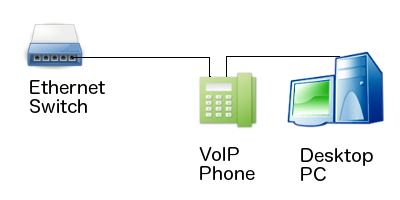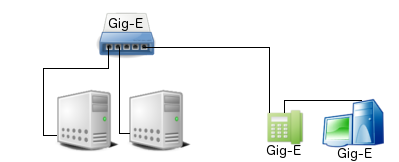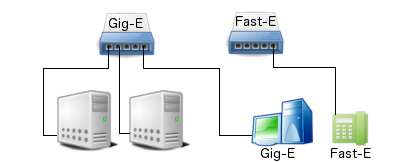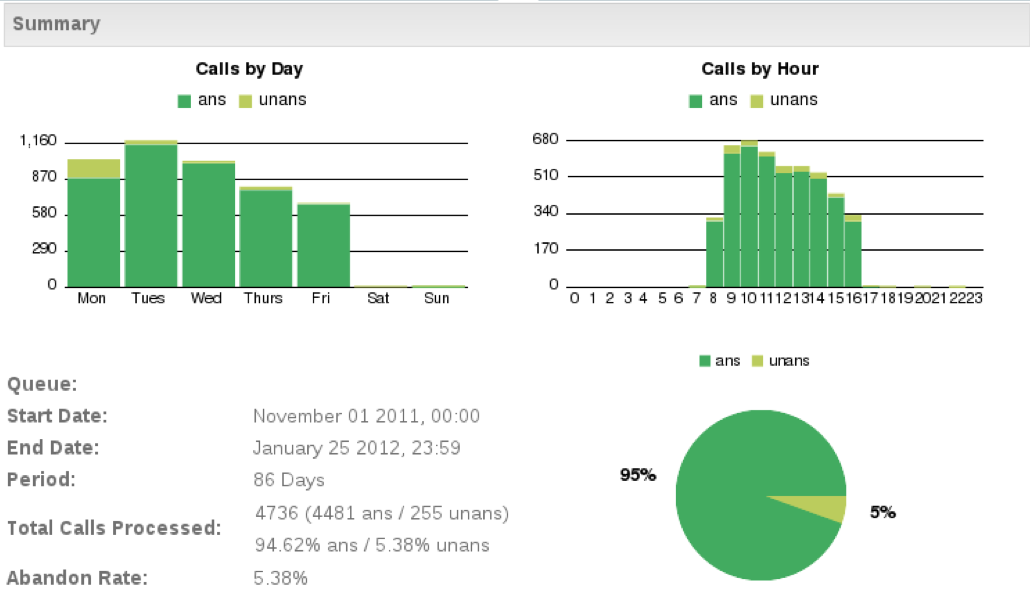You are here
Network Planning for Gigabit Ethernet and VoIP
Table of Contents
- FAQ about VoIP on a Gigabit Ethernet LAN
- The Basic Dilemma - Daisy Chaining
- Menu of Architectural Options
- Business Specific Considerations
Questions About VoIP on a Gigabit Ethernet LAN
Migrating to VoIP on a Gigabit Ethernet LAN doesn't have to be an expensive proposition. When adding Business VoIP Phone Service and Hosted PBX / Virtual PBX to your LAN there are several expenses to consider. Gigabit Switches (especially POE) and Gigabit VoIP Phones are more expensive than their 100mbps counterparts. Wiring can also add expense during a LAN upgrade. This guide will help you answer the following questions.
- I have a Gigabit Ethernet LAN and I am moving to VoIP, do I need to buy Gigabit Ethernet Phones?
- Will VoIP Office Phones slow down my PC?
- Will VoIP Phones prevent me from moving to Gigabit Ethernet in the future?
Daisy Chaining a Gigabit Ethernet PC to a VoIP Phone

The most common office configuration consists of one desk for each employee. At the desk you have a PC and a phone. There is a single network cable going to the desk. This network cable first connects to the phone, and then through the phone to the PC with another short cable. This provides both the phone and the PC with network connectivity. However, the PC is limited to the bandwidth rate that the Phone supports. If the LAN switch is a gigabit ethernet switch, and the PC has a gigabit ethernet interface, putting a standard 100 mbps VoIP phone in the middle will drop the rate of the connction down to 100 mbps, thus negating the two gigabit ethernet components. This article discusses the trade-offs and considerations surrounding this environment.
Architectural Options for VoIP Phones on a Gigabit Ethernet LAN
Here are your options. All this talk boils down to choosing one of the following three options. The simplest way to choose between them is to answer the questions below, price each option, and decide if the cost is worth the benefit.
Option #1 - Hybrid

- Fast Ethernet for PCs and Gigabit for Servers
- Most Economical Option
- Suitable for the large majority of small and medium sized businesses
- Does not require additional wiring if you already have one network cable to each desk
- Employs relatively inexpensive 100 mbps Power Over Ethernet switches
Option #2 - Everything Gigabit

- Most "Future Proof" Option
- Gigabit Ethernet Switches
- Gigabit Ethernet VoIP Phones
Option #3 - Parallel Networks

- Optimal for New Constructions
- Utilize the low cost industry standard 100 mbps VoIP Phones
- Scale and manage your data LAN and your VoIP LAN independently
Considerations when running VoIP on a Gigabit Ethernet LAN
There are factors that vary from business to business. Here are some questions that will guide your decision.
Do you have Servers on your Premise?
Businesses are undergoing a fundamental technological transition, with servers moving away from the business premise and being replaced with services in the cloud. When a service is accessed in the cloud, the bottleneck in communications with that service is often the bandwidth of the connection to the internet. When the server is located on the business premises, the internet connection is not a factor and the desktop computers communicate directly with the server over the LAN. If you do have servers on your premise, you should consider the maximum throughput between one individual client and the server. Often this maximum throughput is much less than 100 mbits per second. A server talking to multiple client connections simultaneously could exceed 100 mbits per second. For this reason if you have servers on your premise, you may consider putting your servers on a gigabit ethernet segment of your lan and your PCs on a 100 mbps segment of your LAN. If you have servers on your premise, we generally recommend Option #1 (see below).
How much bandwidth do you have on your uplink to the internet? How much bandwidth are you using?
It is a common misconception that simply upgrading a LAN to Gigabit Ethernet will make all of your interactions with the internet faster. There are two scenarios where upgrading from a 100 mbps LAN to a Gigabit Ethernet LAN will not make any difference at all to your perceived speed.
- If your uplink to the internet is less than 100 mbits per second, upgrading to a Gigabit Ethernet LAN will not increase your speeds to the internet. Your speeds will be bottlenecked by your internet uplink.
- If you are not using more than 100 mbits per second, you will not notice the difference after upgrading to a Gigabit Ethernet LAN. A 100 mbps LAN would sufficiently meet your resource demand and would not be the bottleneck in your communications.
Most small businesses are not using anywhere near 100 mbps on their uplink to the internet. This means that Option #1 will likely be your most cost effective solution without negatively impacting your performance..
Do you want Power Over Ethernet?
Power Over Ethernet is a technology that eliminates the need for power adapters for VoIP Phones. This means that you can simply connect a VoIP Phone to the network and it will power on. This makes cabling at the desk neater, as it removes the power plug, and it makes moving phones from one location to another easier. POE also enables higher reliability during a power outage because you can put a UPS on the POE switch, and in the event of a power outage your VoIP phones will stay powered on. Power Over Ethernet technology is implemented in the LAN switch and is supported by most all VoIP Phones. Switches do not come with POE standard. If you must have Power Over Ethernet, you should note that this is a particularly expensive option on Gigabit Ethernet Switches.
Is this a new construction? Is the network cabling already in place? How many network cables go to each desk?
Option #3 is to run two parallel physical networks; one for your computers (data) and one for the phones (voice). That means two cables for each desk, one that plugs into the PC and one that plugs into the phone. It also means two sets of switches. This allows you to separate the VoIP LAN from the PC LAN. This greatly simplifies your network. If you are doing a new construction and you have not yet ran any of your network cables, this could be a cost effective option. Running two cables instead of 1 does not add on much cost. On the other hand if you already have your entire office wired, going back and adding additional runs to each desk can be prohibitively expensive. If this is a new construction you may want to consider parallel networks, detailed in Option #3.
Contact Us
Do you still have more questions? Request a free consultation and a Monmouth Telecom representative will help you better understand your options.
Monmouth Telecom
Founded as an Internet Service Provider in NJ in 1995, Monmouth Telecom has grown to offer a complete set of innovative and economical Business VoIP Phone Services and Business Internet Services. We were NJ's first Internet Service Provider turned Telephone Company in 2000 and in 2006 we began providing businesses with increased functionality using VoIP. Learn more about Who We Are and how Hosted PBX / Virtual PBX is changing the face of business telephone service.
Contact Us
Receive a Free Consultation
877-MONMOUTH
877-666-6688
sales@monmouth.com
Customer Service
732-704-1000
contracts@monmouth.com
Technical Support
Network Operations: 732-704-9000
HPBX Support: 732-704-9950
noc@monmouth.com
hpbx-support@monmouth.com
Locations
Headquarters
Monmouth Telecom
1 Industrial Way West
Bldg D Ste A
Eatontown, NJ 07724
Key Data/Switching Facilities
12 N 7th St.
Camden, NJ 08102
165 Halsey St.
Newark, NJ 07102
423 Washington Ave.
Pleasantville, NJ 08232
18 Paterson St.
New Brunswick, NJ 08901
95 William St.
Newark, NJ 07102
Learn More
Customer Testimonials
Data Services
Business Internet Service
Private Data Networks
Fiber Internet
Network Cabling
Business VoIP Phone Service
Business Phone System
Disadvantages of PBX
Virtual PBX / Hosted PBX
Office VoIP Phones
Features
FAQ
Cisco Vs Polycom
DECT Vs WIFI
CRM Integration
Call Queue Statistics
Click To Dial
Technology Partners
Legacy Telephone Line Terms
Theme by Danetsoft and Danang Probo Sayekti inspired by Maksimer









 All staff located in NJ USA. No overseas outsourcing.
All staff located in NJ USA. No overseas outsourcing.